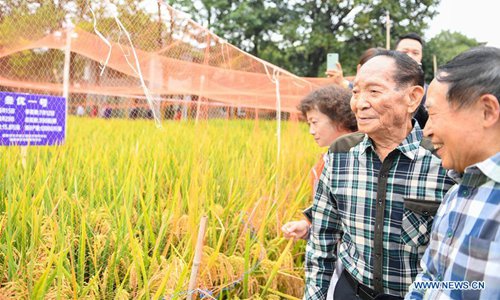China’s ‘father of hybrid rice’ aims to expand annual salt water-tolerant rice yield to 30b kg
Source:Global Times Published: 2020/4/15 10:58:40

Yuan Longping (2nd R) , the "father of hybrid rice", inspects a demonstration field with other experts at Hunan Hybrid Rice Research Center in Changsha, capital of Hunan Province, Oct. 22, 2019. The third-generation hybrid rice developed by Yuan Longping, the "father of hybrid rice," and his team underwent its first public yield monitoring from Monday to Tuesday and achieved high output. The final yield of the tested variety, G3-1S/P19, came to 1,046.3 kg per mu (about 667 square meters), based on two plots of land in Qingzhu Village under the city of Hengyang in Hunan. (Xinhua/Chen Zeguo)
China's "father of hybrid rice" Yuan Longping expects the country's average yield of salt water-tolerant rice to be 300 kilograms per mu (0.06 hectares) in 10 years. That means China can harvest an additional 30 billion kilograms of rice annually, which is enough to feed 80 million people, he said.
"How much is 30 billion kilograms of grain? It is equivalent to Hunan's current total annual grain output, which can feed nearly 80 million people," said the 89-year-old hybrid rice expert and academician at the Chinese Academy of Engineering.
To achieve this goal, he suggested selecting and breeding salt water-tolerant rice varieties with a salt resistance of three to six thousandths and an alkali resistance of pH 9 or higher, and expanding the planting area to 100 million mu within 10 years.
A national technology center for salt water rice initiated by Yuan is also under construction. The center aims to expand the country's saline-alkali land utilization and grain output.
China has 1.5 billion mu of saline-alkali land which is an important reserve arable land resource for the country.
Posted in: MARKETS